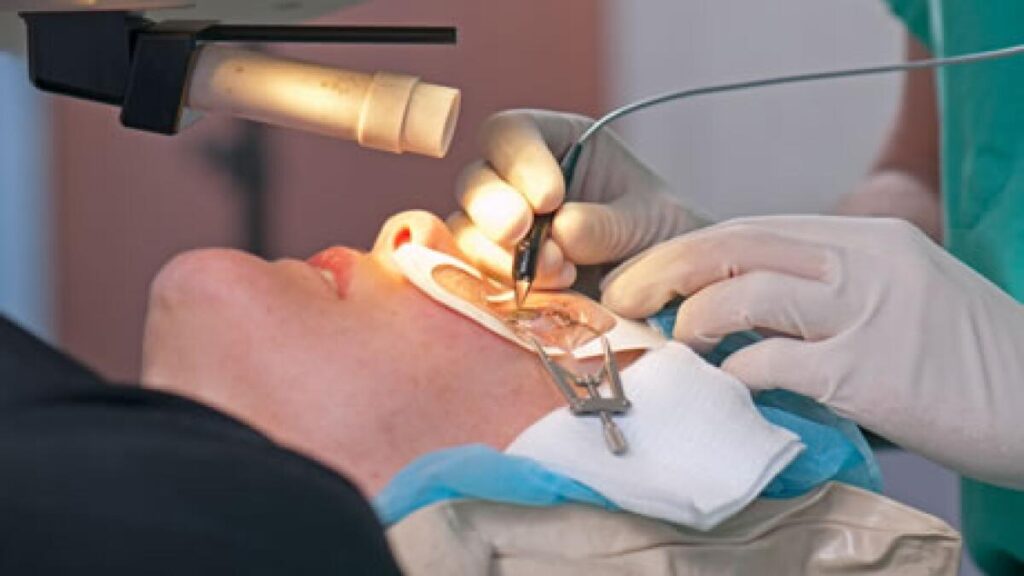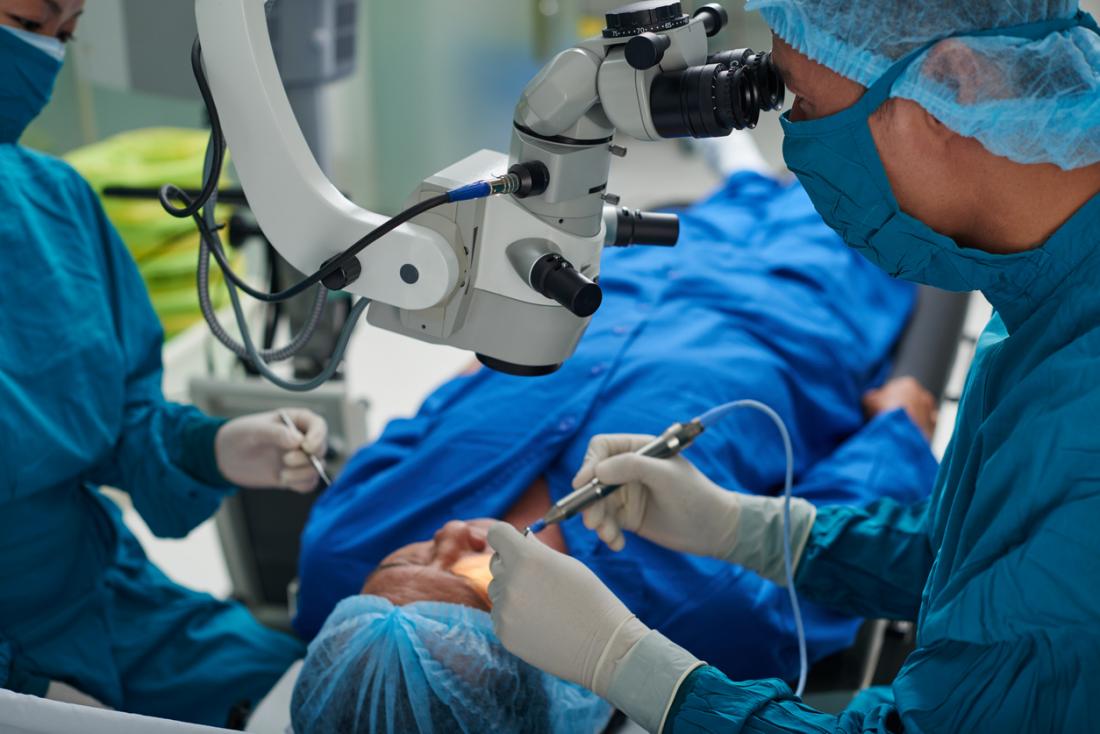Cataracts are clouded lenses that develop in the lenses of your eyes starting around the age of forty, a disease referred to as cataracts. A lot of men and women get cataracts that eventually grow so thick that their vision is blurred or perhaps distorted. By the time they reach the age of eighty, over half of all the Americans will have developed a cataract or perhaps will have undergone cataract surgery.
It’s very efficient to get this particular surgery performed, since it’s a safe and short process that entails replacing the clouded lens with a clear plastic one. If your eye doctor doesn’t advise you to undergo cataract surgery immediately soon, you might not have to have it done straight away.
As Dr. Laura Fine, a cataract expert and clinical lecturer in ophthalmology at Harvard Medical School, points out, “most cataracts advance very slowly and also may be carefully studied until you feel you need improved vision, for instance, when you’ve difficulties seeing or reading street signs.” In the first stages of cataract development, among the most common symptoms is blurred night vision, that is particularly apparent in the rain or even when driving. People often express dissatisfaction with starbursts or headlight glare when driving at night, based on her. Learn more recovery tips for cataract eye surgery.
Suggestions for dealing with cataracts that are too soon or perhaps too small If you’re experiencing the first stages of cataract formation, you might see a small drop in the vision of yours, however, not to the degree that it interferes with the daily activities of yours. In certain circumstances, rather than becoming opaque, the lens just thickens, resulting in nearsightedness rather than becoming opaque. If this’s the situation, the following ideas may be helpful.

- Make a scheduled appointment with your eye doctor to obtain a brand new prescription for eyeglasses or perhaps contact lenses.
- Replace the lightbulbs in your lamps around the house with better ones, particularly in the ones you use for reading or perhaps other close work.
- You may reduce glare by placing lights immediately behind you and directing them toward the task at hand (for example, the book you are reading).
- When reading or perhaps doing work, use magnifying glasses.
- Use contrasting colors to enhance your vision around the house of yours. For instance, a deep blanket on a bright chair is able to enable you to see better.
Many individuals benefit from these precautions, which enable them to easily postpone cataract surgery for years. Some individuals never require surgery at all. Nevertheless, persons who rely on the eyes of theirs for intricate work, like architects, dentists, and jewelers, may require surgery earlier compared to others in one profession.
Are you prepared to consider having cataract surgery? What you must know before you go
Usually, persons with a denser cataract initially undergo a cataract surgery on that specific eye. If the opposite eye only has a bit of cataract, it’s likely that another eye operation won’t be needed for many years. Nevertheless, because the vast majority of persons with age related cataracts have identical illness in both eyes, the next eye is often done several weeks after the very first, once the first has had an opportunity to heal completely.
Doctor Fine estimates the whole process is going to take around 2 weeks in total, because of follow up appointments 1 day after each operation as well as seven days after each cataract surgery. Individuals often have to schedule their cataract surgery around various other treatments, travel, and family obligations, making them harder to schedule.
Dr. Fine suggests it is a wise idea to plan out the logistics ahead of time. As an illustration:
It’s likely that several elderly people may call for a transport home after surgery in addition to a driver or perhaps carer who’ll accompany them to follow up appointments and possibly help with the administration of eye drops after a cataract surgery.
- It is important to follow a couple of safety measures during the very first couple of weeks following a cataract surgery.
- During the very first week, patients should refrain from lifting anything that weighs more than 10 15 pounds.
- Swimming, bathing, and hot tubs should all be stayed away from for the first 2 weeks, as should wearing eye makeup during this period.
It’s feasible that vision is going to be hazy for the very first couple of days following a cataract surgery, but this will progressively improve. “The majority of people have commented that things look brighter and clearer,” Dr. Fine explains.
More than ninety five % of people who have cataract surgery have vision acuity of 20/40 or perhaps better at the conclusion of the process. Despite this, the vast majority of individuals will continue to require glasses for driving and reading.
At what time undergoing cataract surgery, will you stay awake?
During cataract surgery, patients are generally awake and alert. As operation progresses, you may experience lights that are bright or perhaps movement. You won’t, nonetheless, be competent to look at what your doctor is performing throughout the process.
On the day of the cataract surgery, patients are usually provided a mild sedative to enable them to rest and prepare for the process. Anesthetic eye drops will be worn by your doctor to stop you from experiencing some sensations at all.

Is Cataract Surgery a Painful Procedure?
It’s typical for individuals to have minimum discomfort or perhaps agony following cataract surgery. Before and after the surgery, measures are made to ensure you don’t suffer some discomfort.
Many individuals have little or perhaps no recollection of their cataract operation. Despite the simple fact that no general anesthetic is utilized, that is usually required for medical procedures.
Patients that are awake the whole time throughout surgery may have trouble remembering what happened due to the medications they’re taking before and after the operation, based on the drugs they’re taking before and after the cataract surgery.
It’s typical to have some little eye irritation while wearing contact lenses. Nevertheless, any discomfort experienced following the treatment is generally moderate. Over-the-counter pain relievers can be used to lessen some discomfort for a short time.
Before leaving the eye clinic, your eye surgeon will even supply you with medical guidance regarding how to deal with any post surgical discomfort you may possibly be experiencing.
What type of anesthesia will be used during cataract surgery?
A local anesthetic will be administered by the surgeon of yours before the beginning of the cataract surgery. This particular kind of anesthetic numbs a certain component of the body of yours, making it possible for you to remain completely unconscious throughout the process. The eye of yours and upper eyelid will be numbed in this specific situation.
You won’t be put to sleep with local anaesthetic. Conversely, you are able to request sedation, that could be provided either orally or perhaps through an IV. This drug is used to deal with those that are experiencing discomfort or anxiety.
In the event you blink during cataract surgery, what happens?
You’ll be expected to keep your eyelid open during the process. Even though this might seem to be a scary procedure, you won’t really feel anything after your eyelid and eye will be anesthetized before the procedure begins.
